Welcome, one and all, to the finale of Kaze Fui. It has been a wild ride to get to this point, as the series did the impossible. It made running ~140 miles more interesting and dramatic than a fight for the fate of the universe (Looking at you DBZ). So, for the final time, let’s talk running boys.
Starting off, visually, Kaze Fui was beautiful this week. The animation team really kicked it up a notch, with numerous high fidelity shots. Examples of this include Haiji’s panning shot as he runs under the bridge and basically any shot of the dog. I swear, the frame count must have doubled, there was so much motion going on. As if that wasn’t enough, Kaze Fui also knocked it out of the part with its direction and cutaways. Conveying so much emotion in individual images or scenes, with no spoken words, is a feat worth lauding. Simply put, as a finale, this was more than up to snuff visually. Really, the last 5 episodes straight have met that requirement, with only minor CGI popping in. But this episode didn’t even have that. Now though, lets get on to the actual story.
Before we get to the big one, Haiji, let’s start with Kurahara and Fujioka. Though Kaze Fui spells it out, I like the relationship here. Pushing each other to be better. It relates back to Yuki’s point in his episode, about the top being lonely. I am sure that, on some level, Fujioka felt that as well. So having Kurahara to challenge him, I am sure they both felt happy. They had company on their lonely road. Both also make mention of the race never ending. Fujioka asking where the finish line was, if there even was one. Meanwhile Kurahara makes mention of being able to keep running, never stopping. A sort of existential runners high. Even after his race, he was immediately running to beat Haiji to the finish line. It’s not a major plot point, but it’s a detail that show their lives continue, after this story.
Now though, let’s get to our boy Haiji. His race was simultaneously better and worse than I had feared. On one hand, he made it across the finish line on his own! Hurray! On the other hand, we know he was running the entire race hopped up on painkillers. The sound of a rusty gate every time he took a step driving it home how painful it was. His father returned, even starting practice while his son runs in the biggest race of his life. So proud of Haiji, but too proud to admit it. Kurahara being there the moment Haiji’s knee finally snaps, flopping around as he runs the last hundred feet, face turning to horror. The overall story turned out better than I thought it would. But the small details made it all the more powerful. Such that I couldn’t help but tear up.
I also enjoyed getting to see Kurahara complete his growth through the series. We have seen what everyone thinks of him, how he runs, and the almost ethereal quality to it. But now we see what he thinks of Haiji, and the inner strength Haiji must have. Afterall, Kurahara was going to stop running just because of some social stigma. I imagine that, before meeting the cast, he wouldn’t have had the strength to keep going with a busted knee. Through Haiji though, he sees a different kind of strength. Kaze Fui makes this obvious, with his differing color. That or I am reading to much into it and its just a different color for a different person. Either way, I love where their relationship went, and when combined with the epilogue made for a great complete arc.
Before I get to the epilogue though, I have to say, Kaze Fui’s near perfect finale was astounding. It was not 1, not 2, not even 3 but 5 straight episodes payoff. 5 straight episodes of climax, completing each of our main cast’s arcs. Going into this finale, I was unsure how it would possibly fill 5 episodes with a single race. Yet the pacing was fantastic, and just enough hints and buildup was given to make each runners episode its own miniature finale. This consistent climax after climax perpetually made the next episode even hyper, like some kind of score multiplier. As a result, this was one of the most memorable and complete series finale in recent memory. The payoff here alone makes me recommend this series to anyone who likes sports anime.
Finally, let’s talk epilogue. I love a good epilogue. Similar to Planetes, an epilogue gives a more complete sense of closure. For a series so focused on their dreams and the effect running has had on their life, an epilogue is almost required for Kaze Fui. And it did not disappoint. We saw all of the older students graduates, with jobs or school. Having grown from their experience, changing their outfits and yet still keeping their easy relationships. We got to see our younger students having become the new seniors, leading a reinvigorated Track team. Most of all though, we got to see Kurahara as the team captain, a perpetual smile on his face. Becoming the Haiji of the team, while Haiji goes on to coach others, since his running days are over. Kaze Fui has done a great job with this cycle of teams, and I couldn’t be happier.
So all in all, if it’s not obvious by now, I loved this finale. It was fantastic, and has exceeded all expectations I had at the start of this series. These boys have become some of my favorite characters and their story has challenged Hajime no Ippo as my favorite sports anime. Without a doubt it is a drama I will remember, in the same likes as Rakugo. I realize this closing blurb is a bit short, as I want to save most of my gushing for the final review. But suffice to say, I love Kaze ga Tsuyoku Fuiteiru, Run With the Wind, and I hope you do to. Thanks for being with me on this journey, and I hope you enjoyed it.

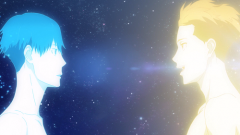

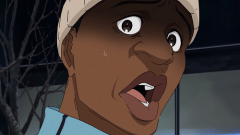
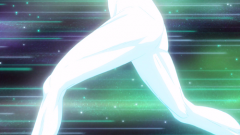
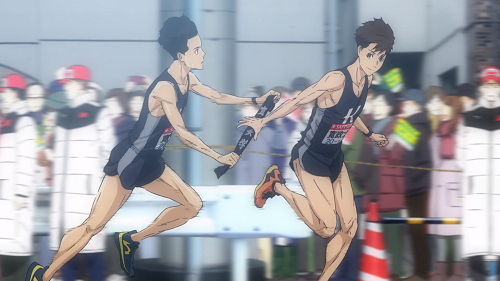
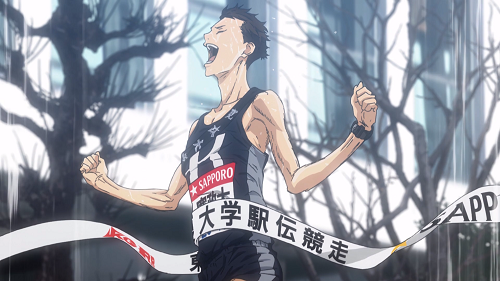
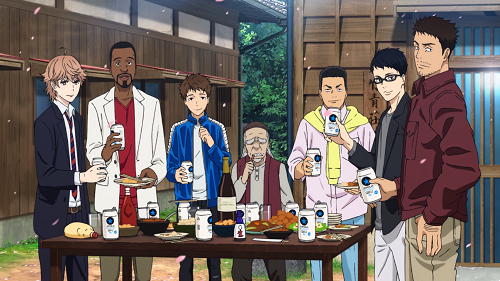
Great job covering this, I agree with you enough that I don’t think I need to look at any other take beside yours.
Anyways I know people who follow this blog aren’t the most talkative (since psgels, so since always), but keep it up people are reading and appreciating.
You have no idea what this means. I love every bit of feedback I get, but its always a warm fuzzy feeling to get someone comes out and says they appreciate it. Keeps me going.
I am glad you enjoyed the series! The final review will be out soon I think. Just need to polish it up a bit more.
I agree Kaze ga mostly nailed its ending, but if you allow me one complaint … I think Haiji’s whole “why do we run, and what are the heights that we seek?” storyline wasn’t resolved very satisfactorily. To be fair, the episode did address it a bit: Haiji admires Kurahara for the beauty of his running form and the purity of his love for running, and Kurahara in turn admires Haiji for the strength he has to push past his limits and never give up fighting for his dreams. And in the epilogue there were those ruminations about how runners are always defying the wind, which presumably meant something like trying to challenge their limits, even though – like the wind – it’s impossible to overcome them entirely? And besides, giving one determinate answer that everyone can live with is probably going to be impossible, so maybe an open-ended answer is the best we could get. But on the other hand, for a storyline that was so central to Haiji’s arc and the themes of the series more generally I think I’d have preferred a somewhat less ambiguous resolution. Saying that all answers lie “beyond the wind” instead of, you know, actually trying to answer the question, feels like a bit of a cop-out to me.
But maybe I’m just bad with symbolism (actually, I definitely am) and/or impatient with open endings. What did you make of it?
An interesting question. To me, that came down to the individual. I think “Why do we run?” as a question was answered by each individual teammember. You spelt out Haiji and Kurahara’s reasons, but we can also look at other cast members. Nico runs because he loves it, not to win or compete, in spite of his body. King runs because he doesn’t have to pretend to be someone he is not while doing so. Prince runs to emulate his heroes, to try something new. Etc, etc.
I think it is a question meant to be answered by the individual, and that the only satisfying answer is your own. Thats why the final line of the whole series is “So, do you like running?” in their closing statements. Its asking you, the viewer, do you like to run? Why do you run?
Your right in that a determinate answer would be impossible. It would never satisfy everyone and I think would be worse than what was given. So while the open ended answer doesn’t satisfy a person immediately, I do believe it makes you the viewer think on it yourself. It’s not an easy thing to answer, but the series trys to set you on that path.
I could get philosophical and ramble about it for awhile, but long story short, thats what I believe. That the purpose of the question and the series is to help you form your own answer. Because that is the only one that will be satisfying to you.
Thanks! That’s an interesting interpretation. Alas, even this series hasn’t sold me on running. I’d much rather cycle – less hard on the legs. :p
One note though: remember that at certain points in the series Haiji did seem to be looking for a single answer that applies to everyone. For example, in the arc where the twins rebelled he said that he wasn’t sure yet what the “heights” they (all of them) were aiming for are, and that he’s still trying to find out. And in conversations with Kakeru he stressed that it can’t be about speed (if that’s what you’re aiming for you should just fly in a plane instead), or about winning a competition or beating records (that’s way too contingent to have much meaning).
So that raises the question: what *are* the heights that runners should aim for? (Which is different from the question what each and every person gets out of it: as you point out, the series does address that question very well.) And I think the series didn’t resolve that theme entirely satisfactorily. As I said, Haiji and Kakeru’s segments did provide some hints at an answer (they were each looking for a kind of strength they lacked), as did the epilogue (running against the wind and all that), but I feel like I didn’t quite get the closure on this theme that I was hoping for.
It’s just a minor gripe though, because otherwise I thought it was an excellent finale of one of the best sports series (possibly just the best) I’ve had the pleasure to watch. Well, maybe the epilogue could have been a bit longer too, because now there wasn’t enough time for Haiji’s sacrifice to really hit home. But I get what they were going for, of course, wanting to end on a positive note and all.